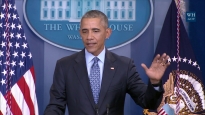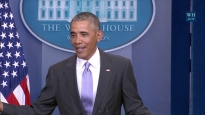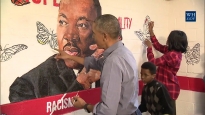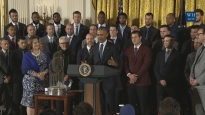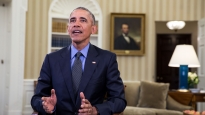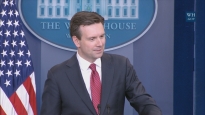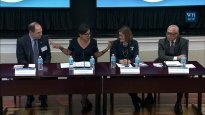President Obama Speaks on Student Loan Interest Rates
June 21, 2012 | 9:22 | Public Domain
With less than 10 days left for Congress to prevent interest rates on student loans from doubling, President Obama calls on students to tell lawmakers: double down on America’s future, don’t double my rates.
Remarks by the President on College Affordability
East Room
1:36 P.M. EDT
THE PRESIDENT: Thank you. (Applause.) Thank you, everybody. Thank you. Everybody have a seat. (Applause.) Well, it is good to see all of you.
AUDIENCE MEMBER: We love you!
THE PRESIDENT: I love you guys back. (Laughter.) I have to say, the -- I don’t know about the choice of music coming in here, though. (Laughter.) I love my Marine Band, but this is kind of a young demographic for the piano cocktail hour. (Laughter.)
So some of the most fun I've had as President is when I get a chance to talk with you, college students, about the importance of earning a higher education in today's economy. And I'll admit that the East Room isn't as rowdy as Carmichael Arena at UNC, or -- we got any UNC folks here in the house? There we go. Coors Center at CU Boulder -- any -- no? Okay. (Laughter.) I have to say that most of you are much more dressed up than usually when I see you in your own natural habitats. (Laughter.)
But our message today is serious. Right now, the unemployment rate for Americans with a college degree or more is about half the national average. They earn twice as much as those who don’t have a high school diploma. So whether it's at a four-year college, or a community college, or a technical program, some form of higher education, something beyond high school has never been more important. It's the surest path to finding a good job, earning a good salary, making it into the middle class.
And at the same time, over the last two decades, the cost of college has doubled -- it's actually more than doubled. And that means -- and I don’t have to tell you, because you're probably tallying it up right now -- the cost for you to take out loans has increased, and you are more likely to rack up more debt. The average student who borrows to pay for college now graduates with about $26,000 of debt from their student loans. Americans as a whole now owe more on student loans than they do on their credit cards. And that is wrong, because we cannot afford to price the middle class and folks who aspire to go into the middle class, we can't price them out of the college education market. We can't stand by when millions of young people are already saddled with debt just as you're starting off.
Your parents, your grandparents, oftentimes they were in a position where when they got that first job, the first thing they're thinking about is, how do I save to buy a home and start a family. And if you're already dealing with a big bunch of debt before you even get started, that’s a problem. And it's mind-boggling that we've had this stalemate in Washington that threatens to make the situation even worse.
So the reason you're all here, the reason all these fine-looking young people behind me are here is that in just over a week the interest rates on federal student loans are scheduled to double. I’ve been talking about this now for what -- a month and a half, two months, three months, five months -- I’ve lost track. (Laughter.) We’ve been talking about it for a long time. If Congress does not get this done in a week, the average student with federal student loans will rack up an additional $1,000 in debt over the coming year. If Congress fails to act, more than 7 million students will suddenly be hit with the equivalent of a $1,000 tax hike. And that’s not something that you can afford right now.
Now, as I said, if this warning sounds familiar, we’ve been talking about this for months. Congress has had the time to fix this for months. It’s part of the reason why everybody here looks impatient. (Laughter.) This issue didn’t come out of nowhere; it’s been looming for months. But we’ve been stuck watching Congress play chicken with another deadline. So we’re nine days away from thousands of American workers having to walk off their job because Congress hasn’t passed a transportation bill. We’re 10 days away from nearly 7.5 million students seeing their loan rates double because Congress hasn’t acted. This should be a no-brainer. It should not be difficult. It should’ve gotten done weeks ago.
Now, the good news is there are folks in Congress trying to do the right thing. Last month, Democrats in the Senate put forward a plan that would have kept these rates in place without adding a dime to the deficit. Unfortunately, Senate Republicans got together and blocked it. Over in the House, the Republicans said they’d keep these rates down only if we agreed to cut things like preventive health care for women, which obviously wouldn’t fix the problem, but would create a new problem.
This is -- even as they were voting in lockstep for an economic plan that would cut financial aid for nine million college students by an average of $1,000 and give a $150,000 tax cut to wealthy Americans. So I recognize that there’s been some effort to change the subject from this rate hike.
One Congressman warned that this is all about giving college students “free college education” -- which doesn’t make much sense, because the definition of a loan is it’s not free -- (laughter) -- you have to pay it back. Others have said we’re just talking about student loans to distract from the economy. That doesn’t make much sense because this is the economy.
This is all about the economy. This is all about whether or not we are going to have the best-trained, best-educated workforce in the world. That improves our economy. And higher education cannot be a luxury reserved just for a privileged few. It’s an economic necessity for every family, and every family should be able to afford it.
So you guys, during this period when you’ve been in college have been some of the toughest economic times since the 1930s, and there are still a lot of challenges ahead globally. And we can’t control every economic headwind that we face, but this is something we can control. This is something we can do something about. Stopping student rates from doubling at the end of the month is something we can do right now to make a difference in the lives of all the American people.
There’s still 10 days for Congress to do the right thing. I understand that members of both parties say they want to get this done, and there are conversations taking place, but they haven’t done it yet. And we’ve got to keep the pressure on.
That’s where all of you come in. Over the past few months, there are so many students and parents who have been working hard to shine a light on this issue. You’ve rallied on campuses, in your communities. You’ve called, you’ve emailed, you’ve tweeted your representatives in Washington. So you’ve played your part in making sure your voice is heard and your democracy is responsive.
My main message is, as you guys embark on this day of action, I want to make sure you keep this going. Don’t stop until it’s actually done. There is nothing more powerful than millions of voices that are calling for change, and all of your voices can make a difference. So keep telling Congress to do what’s right, to get this done. Tell them now is not the time to double interest rates on your student loans. Tell them to double down on an investment in a strong and secure middle class -- and that means your education. Tell them now is the time to double down on an America where everybody who works hard has a fair shot at success.
And for those who are not here and are watching, if you tweet, use the hashtag #dontdoublemyrate -- (laughter) -- #dontdoublemyrate. But I tell you, when I look out at this group right here, you give me confidence in America. You make me optimistic, not only because you’re getting a great education, but also because all of you are participating and making sure that this democracy works the way it’s supposed to. We need outstanding engineers, and we need outstanding nonprofit leaders, and we need outstanding entrepreneurs, but we also need outstanding citizens. And that’s what you guys are displaying by your presence and your activities.
So, keep it up. Let’s get this done. Thanks, everybody. (Applause.)
END
1:47 P.M. EDT
|
January 18, 2017
|
January 17, 2017
|
January 16, 2017
|
January 16, 2017
|
|
January 14, 2017
|
January 13, 2017
|
January 13, 2017
|
January 12, 2017
|
